Top News
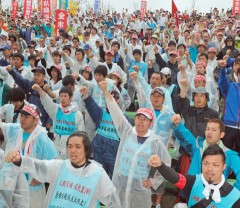
May 20, 2013 Ryukyu Shimpo
On May 19, at the Ginowan Seaside Park, the Okinawa Peace Movement Center and the 5-15 Peace March Executive Committee held a citizens’ rally to call for the protection of life and peace. This was held in the year that Okinawa marked the 41st anniversary of its reversion to Japanese sovereignty on May 15, 1972.
According to the organizers, about 3,500 people from all over the country participated in the rally. They adopted a declaration opposing the additional deployment of MV-22 Osprey aircraft to Okinawa and the plan to build an alternative base for U.S. Marine Corps Futenma Air Station in Henoko in Nago. In the declaration, they protested against Osaka Mayor Hashimoto’s remarks that comfort women were “necessary” and that the U.S. military should use the local adult-entertainment business. They also opposed the Liberal Democratic Party administration’s moves to amend the Constitution and called for a nuclear-power free society.
The peace march started in Miyako on May 11 and in Yaeyama on May 15. On the main island of Okinawa, participants started three different courses on May 17, with about 1,300 people taking part on the final day, May 19. Chairman of the Executive Committee Shiko Sakiyama told the participants, “In Okinawa, our lives are constantly affected by noise from military aircraft. We wonder if Japan is really a sovereign state? We will continue to state our feelings about peace.”
Kim Bok-dong, 87, who was forced by the Imperial Japanese Army to serve as a comfort woman said,” During wartime, everyone always end up becoming a victim one way or another. Let’s join forces to create a world without war.” She has called for the Japanese government to apologize and provide compensation.
(English translation by T&CT, Mark Ealey)
Go to Japanese
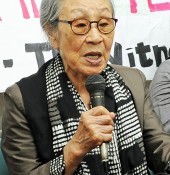
May 19, 2013 Ryukyu Shimpo
Osaka Mayor Toru Hashimoto, co-leader of the opposition Japan Restoration Party, plans to meet former comfort women on May 24. On May 18, one of the women, Kim Bok-dong, held a press conference at Shalom Hall in Okinawa Christian University in Nishihara. Hashimoto said that comfort women had served a necessary role in maintaining discipline in the Japanese military before and during the Second World War. Kim objected to Hashimoto’s remarks, saying, “If Hashimoto thinks the comfort women regime was necessary, then would he send his daughters to prostitute themselves at comfort women brothels.”
Mentioning that the Japanese military coerced them into prostitution, Kim said, “I am one of the comfort women who suffered such hardships. I am here to serve as witness to the existence of the system. I am living proof of it.”
Kim criticized Hashimoto’s remarks, saying, “Hashimoto said that comfort women were necessary, but he does nothing to reveal the historical truth of the matter, or to resolve the issue of comfort women. This is not humane behavior.”
Referring to the meeting with Hashimoto on May 24, Kim said, “I tried to meet him in the past, but was not able to. If I am able to meet Hashimoto this time, I want him to apologize for the past and to say that the Japanese government will legally compensate the victims.”
Kim visited Okinawa from South Korea to speak for the “Exchange meeting with halmeoni (grandmother in Korean) to study the Imperial Japanese Army’s comfort women issues.” The executive committee and the Okinawa Christian Peace Studies Center co-hosted the meeting on May 18. Kil-Whnok, 84, a former comfort woman attended a lecture presentation held in Fukuyama in Hiroshima Prefecture and criticized Hashimoto’s remarks. Kim will attend the meeting with Hashimoto on May 24.
(English translation by T&CT, Mark Ealey)
Go to Japanese
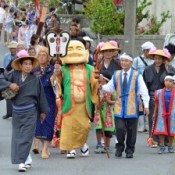
May 12, 2013 Ryukyu Shimpo
On May 10, or April 1 in the lunar calendar, in the Furugen district of Ozato in Nanjo, the miminme festival was held to pray for good crops and prosperity for the community. People walked through the streets for the michijune parade and those watching applauded the children who danced singing miminme shiyapu to a sanshin accompaniment.
The parade started from the house of the Teruya family at around 5:00p.m., going around four different locations including the Ashibina Sacred Garden.
At the head was a standard-bearer holding a flag featuring an image of a naginata or a long-handled sword to drive away evil spirits. He was followed by a miruku or maitreya, elderly men and women and then children. Participants performed a traditional dance and bojutsu (the art of using a stick as a weapon) at ashibimo or event square. In closing of the festival, miruku performed the kachashi dance with the ward chief, Ryozo Uehara.

On May 10, at Furugen district of Ozato in Nanjo, children performed dances.
Children from nursery schools and elementary schools dressed in colorful padded sleeveless
kimono jackets sang and danced for the
miminme. In their hands they held
jinnaku or sticks with 5-yen-coins tied on them. Elementary school age boys performed the
yuntanza dance and girls the
suriagari dance. Runa Uehara, 9, said, “I practiced the dance for a month and really enjoyed it. I wasn’t at all nervous.”
The ward chief said, “Many, including children and older people, took part. The festival went smoothly. Our community will do well in future.”
(English translation by T&CT, Mark Ealey)
Go to Japanese

April 26, 2013 Ryukyu Shimpo
The Ryukyu Immunology Corporation, which is located in Uruma, has produced antibodies that detect the human immunodeficiency virus or HIV, that causes AIDS, in the early stages of infection, and using this antibody has made assay kits for in vitro diagnostic tests and for research. The corporation said these kind of kits were being manufactured for the first time in Japan. The corporation will look for a market for the product as technology produced in Okinawa. The Ryukyu Immunology Corporation is involved in the development, manufacture and sale of the antibodies used in the diagnosis and research of infectious diseases.
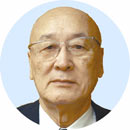
Munechika Hasegawa, the president of Ryukyu Immunology Corporation.
On April 25, the Okinawa Development Finance Corporation invested 15 million yen in the Ryukyu Immunology Corporation. A spokesperson of the Okinawa Development Finance Corporation said, “This project helps to prevent the spread of the infection and will accelerate research into vaccine development.” The corporation will use the funds to purchase new equipment, which will further advance the business.
According to the corporation, HIV antibody testing, which determines the presence of antibodies produced through infection by the virus, is common in Japan. In most cases, HIV is apparent in test results six to eight weeks after infection, but there are some cases that produce a negative result for the detection of the antibodies during the initial infection.
In collaboration with the University of the Ryukyus, the Ryukyu Immunology Corporation has succeeded in purifying antibodies that can identify the HIV antigens and has established a method to measure the infection at an early stage. In addition to selling the reagent antibody as a raw material the corporation has developed a kit for research that can detect HIV antigens in a short time, utilizing antibodies. In partnership with companies outside of Okinawa, the corporation has begun to sell to companies involved in research and drug discovery for HIV.
The corporation has produced in-vitro diagnostic test kits that can check for both antibodies and antigens using a simple method, and has had business talks with a possible partner company. The Ryukyu Immunology Corporation plans to provide its technology to produce test kits for the partner company, which will manufacture and sell them.
In addition to HIV antibodies, the corporation has developed a useful antibody and is working to expand its sales channels and mass produce them. Sales are expected to reach 215 million yen in the fiscal year ending on January 31, 2015. Munechika Hasegawa, the president of the corporation, said, “Further enhancing our skills, we want to distribute them to foreign markets and want to convey our technology, from Okinawa to the world.”
(English translation by T&CT, Mark Ealey)
Go to Japanese
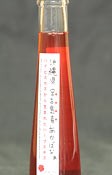
May 4, 2013 Ryukyu Shimpo
Sales are increasing of a pure herbal extract made from hibiscus grown on Miyako Island. Since last May, the Naha-based Gradir Co., which sells preserved flowers, has sold the herb extract and have shipped about 10,000 bottles in just under a year. It has grown to become Gradir’s main product, accounting for 60 percent of the company’s sales. Juice can be made by adding 10 parts of water to one part of essence. Cocktail recipes to go with awamori and beer have also been created.
A 120-milliliter bottle of extract sells for 1,050 yen at hotels and wedding centers in Okinawa. Sales at hotels are going well and the product is attracting positive comments. It was the first product for them to develop other than preserved flowers. Company president, Rieko Tajima, said, “We have succeeded in creating a truly original product.”
Manabu Oshiro, advisor for the Okinawa Chapter of Hotel Bar Men’s Association, Japan, came up with the recipe for the original cocktails. Tajima said, “We are keen to promote Okinawa by making 100 percent locally produced items. We would like to make memorable products for people who visit Okinawa.” The company plans to sell a sparkling variety of awamori by summer. They will strive to develop new products and to further strengthen their brand image. For more information call 098 (869) 1175.
(English translation by T&CT, Megumi Chibana and Mark Ealey)
Go to Japanese
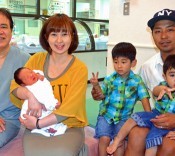
May 3, 2013 Ryukyu Shimpo
On April 25, Shota and Olivia Shimamoto celebrated the birth of their new baby Rio born at the Morimoto Gynecology Clinic in Ginowan. By incredible coincidence, Rio has a four-year-old brother Rian and a two-year-old sister Rea who were also born on the same date. A total of 16,000 babies have been born in the clinic to date and director, Tetsuya Morimoto, said, “This is the first time that we have ever had three siblings with the same birthday!”
Olivia was considering giving birth to Rio on the same date as other two children but the doctor said, “Your baby will be born at a time that nature sees fit.” As it happens, the due date passed and Rio was born at around 6:00 p.m., on April 25.
Shota said, “When we had our second child, Rian, I couldn’t believe it. But it’s a miracle that our third child was also born on same date. We want these three children to grow up helping one another along the way.”
This year, Rian and Rea were not able to celebrate their birthday. “We want to have a big gathering to celebrate the three children’s birthday next year,” said Olivia.
(English translation by T&CT, Hitomi Shinzato and Mark Ealey)
Go to Japanese
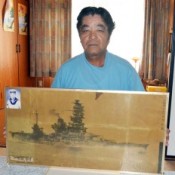
May 3, 2012 Ryukyu Shimpo
Matsuo Chinen, 63, a resident of Sashiki in Nanjo, found a photograph of the Japanese battleship Hyuga, which saw service during the Pacific War, at his father’s house in Naha. His father Matsukichi, who died at the age of 75, kept a record of the ship’s journey from its departure to its end on the back of the photo frame. Notes by Matsukichi with the same content were also found.
Matsuo found the photograph and the notes when the house was to be demolished. In 1996, Matsukichi, who was on board the battleship as a marine, wrote a collection of notes entitled The Battle of Leyte Gulf and the End of the Battleship Hyuga.

On the back of the frame there is a record of the movements of the Hyuga from its departure to its last day of service.
The notes begin in 1944 when the Hyuga received its mission orders and describe the living conditions and terrifying scenes of the Battle of Leyte Gulf in vivid detail.
Matsuo said that before his death his father told him that the war was a miserable and horrible experience.
The notes close stating that “I pray for those who lost their lives and wish for lasting peace,” and “As long as I live, as someone who has been through such valuable experiences and knows how precious life is, I will treasure my life and pray for good health.”
“I think that my father always kept these feelings in mind and that he treasured the photograph,” Matsuo said.
(English translation by T&CT, Lima Tokumori and Mark Ealey)
Go to Japanese
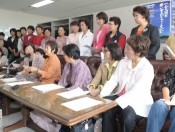
May 15, 2013 Ryukyu Shimpo
Osaka Mayor Toru Hashimoto, the co-leader of the opposition Japan Restoration Party, has said that the Japanese military’s “comfort women” regime of forced prostitution of Asian women before and during the Second World War was necessary for Japanese soldiers to maintain discipline. He also said that U.S. soldiers in Okinawa should make more use of the adult entertainment industry there in order to reduce sexual crimes against local women. On May 15, women’s groups in Okinawa held a press conference at the Okinawa Prefectural Office at which they protested against his statements.
Representatives of the groups called for Hashimoto to apologize and to retract what he said. One said, “Hashimoto’s remarks look to justify outright discrimination and impact on the dignity of all human beings. We are surprised and angry about his remarks, which we find distasteful.”
The group issued a proclamation and sent it to the Osaka Municipal Office that same day.
In the press conference, Suzuyo Takazato, co-chair of the Okinawa Women Act Against Military Violence said, “Factual records exist proving that the Japanese military deceived women and coerced them into prostitution in so-called comfort stations. Hashimoto suggested that comfort women had played a necessary role in making war-crazed soldiers vent their sexual frustration and that currently local adult entertainment industry could serve the same purpose. We need to speak up against these kinds of remarks that deeply offend people.”
Masako Ishimine, the head of the Okinawa Prefectural Women’s Groups Liaison Council demanded Hashimoto’s resignation, saying, “Hashimoto is indifferent towards the suffering of the women who were coerced into becoming comfort women and suggests that it makes sense for women to provide sexual services to soldiers. He sees women as something to be used. I want Hashimoto to resign as Osaka mayor and as co-leader of the party.”
(English translation by T&CT, Mark Ealey)
Go to Japanese
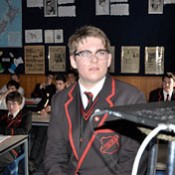
May 13, 2013 Masatoshi Omine of Ryukyu Shimpo
Joe Drago, an 87-year-old Boston resident who fought in the Battle of Okinawa talked about the battle through Skype to a group of students at St. Bede’s College, a Catholic boys’ high school located in Christchurch, New Zealand. The lesson was arranged by New Zealander Mark Ealey who has been involved in the translation of several works on the civilian experience in the Battle of Okinawa. A total of 26 students listened intently as Drago related his experiences from the battle. During the war, Joe Drago fought as a member of the 6th Marine Division, which saw action in Okinawa. Ealey said that Drago talked to the boys about aspects of his experiences from the time of the landings through until when he was demobilized after the war. Drago became emotional when he cast his mind back to how many of his comrades were killed in the fierce fighting that he experienced in places such as Sugarloaf and how on a road near the coast in Onna-son many civilians were killed at night when members of his unit mistakenly opened fire thinking that they were Japanese soldiers trying to launch an infiltration raid.
St. Bede’s College history teacher Callum Wilson, 29, said, “It was an extremely valuable experience for us to be able to speak to someone who has actually been to war. I was struck by how Joe’s painful memories moved him to tears after all these years. That shows how powerful the emotions are that he feels about what happened during the fighting in Okinawa.”
Liam Donnelly, a 16-year-old student who took part in the class, said, “That Mr. Drago can still visualize what happened back then on the road at Onna-son really struck me. I knew that the battle had occurred, but I didn’t know that it was as awful as Joe described to us.”
Mark Ealey, who organized this discussion through Skype, became acquainted with Joe Drago when he contacted the 6th Marines’ historian to ask if any of the division’s former personnel would be prepared to tell him about their experiences on Okinawa. Joe Drago said that he thought that it was a good idea to let young people know about aspects of history that do not get covered in textbooks. Ealey said, “I wanted to have some young New Zealanders learn something about the Battle of Okinawa. I’d like to try it again, maybe after doing even more preparation with the students at this end.”
(English translation by T&CT, Mark Ealey)
Go to Japanese
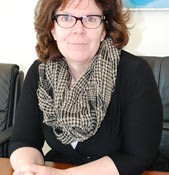
May 4, 2013 Hideki Matsudo of Ryukyu Shimpo
There has been ongoing tension between Japan and China over the Senkaku Islands, which are administered as part of Okinawa. The Japanese government emphasizes the Japan-U.S. alliance as a diplomatic cornerstone and strives to gain the support of the U.S. government with regard to the Senkaku Islands dispute. At the same time, the Liancourt Rocks (Takeshima/Dokdo) dispute has been negatively affecting relations between Japan and South Korea.
Sheila Smith, senior fellow for Japan Studies at the Council on Foreign Relations, a major Washington-based think tank, gave an interview with the Ryukyu Shimpo about the American perspective on what is happening in East Asia.
Interview with Sheila Smith by Hideki Matsudo of Ryukyu Shimpo
February 20, 2013
MATSUDO: These days there is ongoing tension in East Asia over territorial issues around the sovereignty of the islands of Takeshima and the Senkakus between China and Japan, and South Korea and Japan.
SMITH: I think that the role that the island disputes plays in each of those relationships, the Japan/South Korea and then the Japan/China … is very different. So they each have their own stories. But the fact that they happened in 2012 says a lot about the fact that I think the basic geostrategic balance in Northeast Asia is changing and I think Japan has had some setbacks … the triple disasters, economic challenges.
In the Takeshima/Dokdo case, as you know, the South Korean Coast Guard controls it. It’s a story that goes back to the 1960s and Syngman Rhee, and it has never been a real – except for Shimane Prefecture – it’s never been an issue that either side has felt they were going to change. So, Japan hasn’t tried to take away the islands from South Korea, and South Korea, of course, has control over them. So it exists, but it’s never been a serious piece of the relationship, I think, until President Lee Myung Bak went there. I think the motivations behind Lee Myung Bak’s visit last year had nothing to do with China, and so I don’t think it’s South Korea and China and ganging up on Japan. I think it had very much to do with internal South Korean politics. I think there is a growing sense in South Korea today of discomfort with the 1965 Treaty and the terms of the treaty. That story has a lot to do with South Korea democratization, activism, especially on the issue of sexual slavery of Korean women.
I think that on the Senkakus/Diaoyu Islands, Japan has never stationed people on the islands. It has never sent the Coast Guard there. It has not built a heliport, even though the Ishigaki City and in some cases others in the Okinawa prefectural government in the 1970s really wanted to be more forward-leaning in terms of an administrative presence on the island, Japan decided not to do that. That was for the sake of normalization of relations with China. So with the 1978 Peace Treaty, the issue of those islands really became quite important in the final stages of that negotiation. So Japan has restrained itself in some ways in order to maintain a peaceful relationship with China.
Last year, again for domestic political reasons I believe, the Tokyo Governor Ishihara Shintaro, decided to put pressure on the Prime Minister. I’m still not sure what motivated Ishihara, but clearly he’s now back in parliament. He has his own part, so clearly he saw his own political fortunes as being tied up with his position on the islands. So just like Lee Myung Bak, I think there was some kind of political opportunity that Mr. Ishihara was trying to exploit.
Q: How do you think the U.S. Government should comment on the issue? The U.S. government hasn’t taken any position on the sovereignty issue on the Senkakus.
SMITH: As you know, our basic legal position, which is true for everyone, is that we don’t take sides in disputes over sovereignty. But, we do strongly support their resolution by peaceful means.
But specific to the Senkakus, we have a historical role in the administration of those islands. We see them as being under the administrative control of Japan. Secretary Clinton, on January 18th, made it very clear that we do not recognize any unilateral action by any other party, China or otherwise, to change the status quo. We don’t recognize it. So any attempt to coerce or to pressure Japan, we don’t recognize that there is a change in administrative control over the islands. And, our Security Treaty covers any territory under Japanese administration.
Q: Why doesn’t the Security Treaty cover Takeshima/Dokdo?
SMITH: Because it’s not under the administrative control of Japan. It’s under the administrative control of South Korea.
Q: Earlier this month the Japanese Government announced that a Chinese warship targeted a missile at a Japanese destroyer. What do you see as the impact of this?
SMITH: I think that the Chinese ship’s commander was very lucky that your Maritime Self-Defense Force is calm. But, two things are interesting. One is that Beijing did not know that the incident had occurred. So clearly the central government was not aware. The Japanese media reported the incident, but the Beijing government didn’t know about it. So they then instigated an investigation and it took two days for that investigation to be complete. The Ministry of Defense announced that the incident never happened. However, they said that if it did happen, that radar lock, that the targeting lock, would be a dangerous activity. So, they did acknowledge in some way, whether they say the incident happened or not, they say that that practice is unacceptable, and that is heartening, I think. That is a positive that China understands the danger of allowing local commanders to not subscribe to international norms, to do dangerous activities without permission.
Q: Some people say that tension between China and Japan will benefit the U.S. side, because the U.S. can sell weapons to both countries.
SMITH: The United States is not selling weapons to China. I think the United States is not always selling weapons to Japan, frankly. Sometimes we don’t. But, I don’t think there is any benefit to the United States of this confrontation.
Q: The Liberal Democratic Party tried to repudiate the Kono Statement, the apology.
SMITH: When I hear most Japanese argue about the Kono Statement, it is a kind of a Left-Right, progressive-conservative argument. It’s the kind of argument that only makes sense inside Japan. Outside of Japan it makes no sense whatsoever. The Kono Statement was, I think, a very profound statement of Japanese compassion towards the victims, wartime sexual victims. I think it doesn’t satisfy many in South Korea who want to see a Diet statement, but I think it was a compassionate statement, and to take that away, to repudiate it at this stage, makes no sense outside of the country. It really doesn’t.
What happens in wartime is not always found in some archive or library. And I think when you are looking at post-war reconstruction and reconciliation, whether it’s in Japan or whether it’s in former Yugoslavia, or whether it’s in Africa or in Latin America or wherever it is, recovering from the trauma of conflict and war and occupation is a very long process of healing. And, the healing that needs to happen in South Korea is in large part the acknowledgement of what happened to these women.
Today, the South Korean, so-called Comfort Women, to a large part they’re trying to find some kind of peace. They are in their 80s. They are trying to contend with a very painful memory. And so for me, it is not a question of what’s in an archive or how many numbers you can find. It’s really a question of – Does Japanese society today have the compassion to understand the need for that kind of healing by many people in Asia, who were victimized or were part of the Japanese expansion during World War II.
Japan, I think, has a lot to offer in that global conversation and so I hope that that becomes the way in which Japanese leaders see their future, not in terms of denying what happened in the past, but really in terms of building the kinds of protections for vulnerable populations that are obviously needed.
Q: There is a trend in Japan these days by which young people in particular are becoming more right-wing, more nationalistic. They want the sovereignty issue of the Senkakus clarified. How do you view this trend?
SMITH: I think that the most dangerous thing in both countries in fact, is that kind of populist nationalism. I think that you find nationalism in every country. People are proud of their countries, whether it’s sports activities, or whether it’s the history of their countries, or whether it’s any kind of international competition. That’s a healthy thing. But when it becomes a kind of antagonistic nationalism, then I think there is a danger that that will push the country in directions that are not constructive.
(English translation by T&CT, Mark Ealey)
Go to Japanese
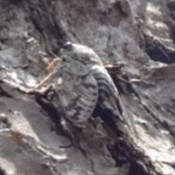
May 10, 2013 Ryukyu Shimpo
On May 2, in the pine forests of Zakimi in Yomitan, Okinawa Meteorological Observatory confirmed hearing the first song of the Platypleura kuroiwae species of cicada. This is the earliest since they started monitoring it in 1958. According to previous data, this cicada usually first announces its presence on June 3, but last year it was on May 7.
This species inhabits the Ryukyu and Amami Islands. The meteorological observatory has been monitoring their first call to assess the timing of the change of seasons.
Their song reaches its peak in June and July. In the northern part of the main island of Okinawa they can be observed until around November.
(English translation by T&CT, Mark Ealey)
Go to Japanese














 Webcam(Kokusai Street)
Webcam(Kokusai Street)


